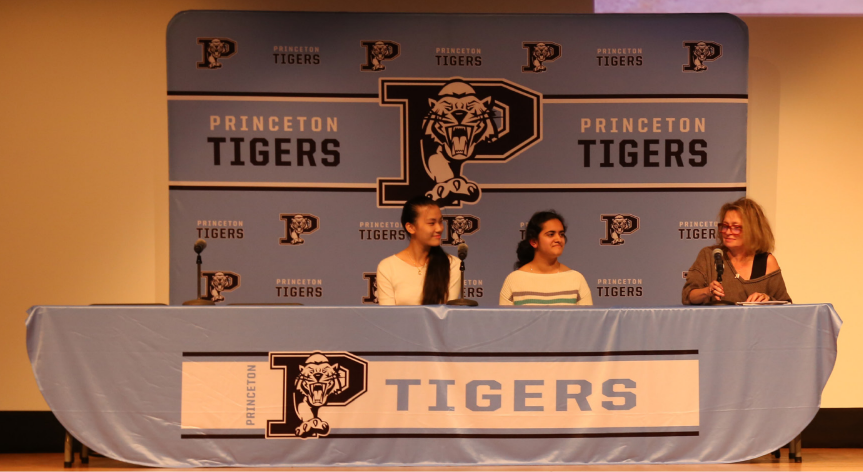On the evening of December 7, PHS welcomed author Kim Foster, who spoke about her experiences with food insecurity in America detailed within her new book, “The Meth Lunches: Food and Longing in an American City.” The event was done in collaboration with PHS Food Aid and featured booths set up by local food agencies, including Send Hunger Packing Princeton, the Princeton Mobile Food Pantry, and Arm In Arm, all to spread awareness about widespread food insecurity.
Throughout her presentation, Foster used many personal anecdotes about the issues she hoped to address. One story covered in her presentation was about an adult she met who was abused and starved as a kid, which left her to deal with emotional trauma and an unhealthy aversion to food for the rest of her life.
“Johnny started bagging [my] groceries, and she mentioned off the top of her head that she was locked in the closet [by her mother] as a child without food,” said Foster. “To this day, Johnny works in a supermarket … surrounded by food. She wonders a lot if she deserves to [even] have food. Kids that are hungry get the message that they don't deserve the most basic needs.”
While running a pantry outside her home in Las Vegas during the COVID-19 pandemic, Foster began to connect to the struggles of individuals with food and created an active community effort through Facebook group discussions and word of mouth.
“[I] live in a very socioeconomically diverse neighborhood … and there are people who are really struggling. At first, I was just putting toilet paper in our little free library and other hoarded goods that no one could get, … like wipes [and] hand sanitizer,” said Foster. “[Then] a bar gave us a fridge. And then, the next thing you know, I'm picking up groceries and it's my full-time job.”
While poverty, addiction, and similar factors might often work to isolate people, Foster observed how food can help build connections between people who might not have much in common and foster relationships that can strengthen communities.
“When we took food to people, we didn't just drop food at people's houses. We stopped, hung out, talked, and heard stories. And so, what that does is it connects that person to the world,” said Foster. “As a high school student, there's probably nothing that you can do to eradicate poverty in your community, but you can create connections.”
Dr. Andrea Dinan, coordinator of service learning and experiential activities, shared how she wanted to allow students to hear Foster’s message about a topic that often isn’t talked about in Princeton.
“Before I worked at Princeton High School, I was really involved in hunger programs, [so when I read the book], it really just moved me. I reached out to Labyrinth Books in town and they were able to get in contact with [Foster] since she is doing a tour to promote her book,” said Dinan. “I wanted to bring in PHS Food Aid, which is very much involved [with] hunger programs in our community, and PHS Generation One because they work with a lot of under-resourced families in town.”
Yugandhara Luthra ’24, a leader for PHS Food Aid and a member of the panel discussion after Foster’s presentation, believes her talk serves as a reminder of what injustices can lie not only within our own town, but also in other communities across the country.
“For those who live in the Princeton community, we are typically sheltered away from poverty,” said Luthra. “At PHS, we can try to …integrate the concepts and encourage discussions of topics like hunger and poverty in order to create more awareness as well. [Foster’s] talk seemed to serve as a reality check [for] how we view our lives, and if PHS students become exposed to her message, then our school community will truly become more inclusive and open-minded.”
After receiving advance copies of the book and purchasing dozens more after release with the help of the PTO, Dinan shared Foster’s story with teachers around the school. According to Dinan, the book was recently added to the curriculum of multiple English classes at PHS, and community members who came to the talk were encouraged to sign up for future discussions with the various supporting organizations in Princeton.
“AP English [Language and Composition students] are reading the book … and [students] in Contemporary Literature are reading it now as well,” said Dinan. “I'm hoping more students come [to the event] because she wants to gear it towards students and really engage with [them].”
Food insecurity is not the only topic that is addressed in the book though, as Foster also hopes to promote healthier eating habits, which could be especially beneficial for students.
“Vending machines in schools are really impacting how kids are going to eat for generations. And it's a hard habit to break,” said Foster. “There are [other] things that you can do when you have events at school; start prioritizing home-cooked food over a food truck or ordering from a restaurant, … [or inviting] parents and staff who have cuisines they want to share.”
Overall, Foster’s advice to PHS students is to get out of their comfort zones and try to learn about others in their community through avenues such as food. Most importantly, Foster believes these discussions are catalysts to understanding and helping others.
“We all live in our bubbles, and we tend to hang out with people who are like us,. … so really what I want people to do after they read the book is [to] jump out of their bubbles [for] a little bit and talk to people,” said Foster. “Be open and curious about other[s], and then make a connection.”
